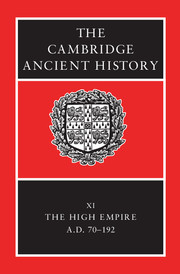Book contents
- Frontmatter
- PART I NARRATIVE
- PART II GOVERNMENT AND CIVIL ADMINISTRATION
- PART III THE EMPIRE
- PART IV ROME, ITALY AND THE PROVINCES
- 12 Rome and Italy
- 13 Spain
- 14 Gaul
- 15 Roman Germany
- 16 Africa
- 17 Cyrenaica
- 18 Britain
- 19 The Danube provinces
- 20 Greece and Asia Minor
- 21 Syria and Arabia
- 22 Judaea
- PART Va ECONOMY AND SOCIETY
- PART Vb ART AND CULTURE
- Chronological Table
- BIBLIOGRAPHY
- Index
- 1 The Roman world in the time of Marcus Aurelius
- 7 The Danube provinces
- References
20 - Greece and Asia Minor
from PART IV - ROME, ITALY AND THE PROVINCES
Published online by Cambridge University Press: 28 March 2008
- Frontmatter
- PART I NARRATIVE
- PART II GOVERNMENT AND CIVIL ADMINISTRATION
- PART III THE EMPIRE
- PART IV ROME, ITALY AND THE PROVINCES
- 12 Rome and Italy
- 13 Spain
- 14 Gaul
- 15 Roman Germany
- 16 Africa
- 17 Cyrenaica
- 18 Britain
- 19 The Danube provinces
- 20 Greece and Asia Minor
- 21 Syria and Arabia
- 22 Judaea
- PART Va ECONOMY AND SOCIETY
- PART Vb ART AND CULTURE
- Chronological Table
- BIBLIOGRAPHY
- Index
- 1 The Roman world in the time of Marcus Aurelius
- 7 The Danube provinces
- References
Summary
VESPASIAN'S REORGANIZATION OF THE GREEK EAST: RECOVERY AND ADVANCE UNDER THE FLAVIANS
Greece, Asia Minor and the islands came off lightly in the civil wars of 6–70. Nero's war against the Parthians, which had in any case been fought in Armenia Major, was over five years before Nero fell, and the rebellion in Judaea was only of local significance. Morale and expectations must have been high in 6–70. It was from the eastern provinces that the final victor came; his troops had largely been recruited there, and he enjoyed the moral and financial backing of ruling circles. Nero might have been the preferred ruler for many Greeks, but Vespasian was superior to the men who had come from western provinces and with the support of western legions to overthrow Nero and fight for supremacy.
But Vespasian was concerned with the military security and solvency of the entire empire and rather with the restoration of Rome, Italy, and the provinces that had suffered than with the sensibilities of his subjects. Some of the changes he made in the East were unwelcome. First, he revoked grants of freedom that Nero or other emperors had made to Achaea, Rhodes, Byzantium, Samos and perhaps Lycia, and he may have dissolved the enlarged koinon that had existed in mainland Greece since Tiberius' time. Disturbances in the cities were the reasons alleged, perhaps in connection with the first of the imposter Neros who were to continue attracting support in the East while it was under the Flavian dynasty; it is likely that Nero's death and Rome's loss of attention had led to speculative upheavals in ruling circles or even demonstrations by the lower classes.
- Type
- Chapter
- Information
- The Cambridge Ancient History , pp. 604 - 634Publisher: Cambridge University PressPrint publication year: 2000
References
- 4
- Cited by

